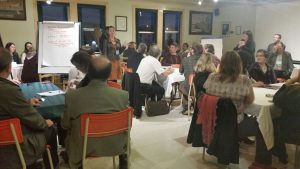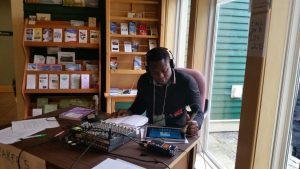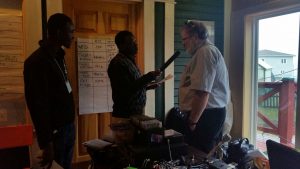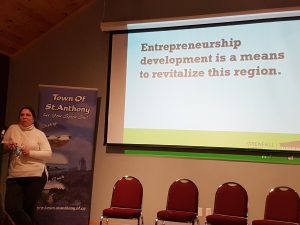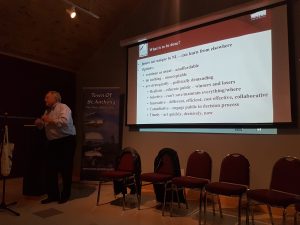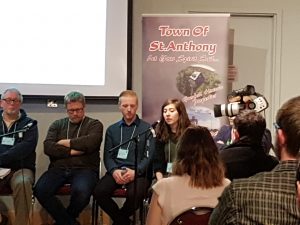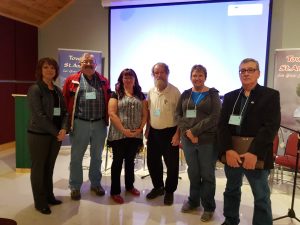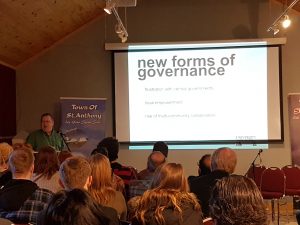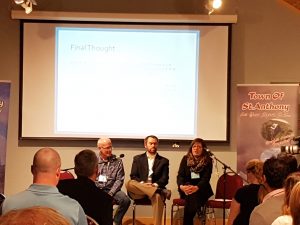Our Way Forward: Sharing Knowledge and Building Capacity for Regional Development
Click here to access the final report!
Conference Agenda and Presentations
Our Way Forward: Sharing Knowledge and Building Capacity for Regional DevelopmentGrenfell Interpretation Centre, St. Anthony |
|
|---|---|
| Tuesday, Nov. 15 | EVENT/TOPIC |
| 7:00 pm | Launch of “Our Way Forward” Conference
Hosted by Mayor Simms and Dr. Mary Bluechardt (Vice-President, Grenfell Campus) |
| Wednesday, Nov. 16 | EVENT/TOPIC |
| 11:30 a.m.- 5:30 p.m. | Dialogue through Radio and Celebration through Music
(interviews and discussion on relevant topics) |
| 6:30 – 9:30 p.m.
|
Regional Population Projections for Labrador and the Northern Peninsula 2016-2036Keith Storey, Harris Centre, Population Project
Open panel session (Introduction by Mayor Ern Simms) Response: Population Panel “Why Stay in St. Anthony?” Youth and Business representatives |
| Thursday, Nov. 17 | EVENT/TOPIC |
| Ongoing | Community Radio Event |
| 8:20 – 8:30 a.m. | Welcome (coffee/tea) |
| 8:30 – 9:30 a.m. |
Regional Governance and Services: Looking to the Future
Mayor Ern Simms, Mayor Dale Colbourne, Mayor Sheila Fitzgerald, Mayor Gerry Gros, Mayor Keith Billiard and Karen Oldford (President, MNL) Regional Governance and Servcies: Trying it on for size Sheila Fitzgerald & Karen Oldford |
| 9:30 – 10 a.m.
|
Canadian Regional Development (CRD) Rural Development through Regionalism Kelly Vodden, Grenfell Campus |
| 10 – 10:30 a.m. | Discussion and Next Steps |
| 10:30 – 10:45 a.m. | NUTRITION BREAK |
| 10:45 – 11:30 a.m. | Entrepreneurship and Innovation: Findings from CRD
Canadian Regional Develoment: a critical review of theory, practice Growing Rural Entrepreneurship is a Social Process |
| 11:30 a.m. – 12 noon | Discussion and Next Steps |
| 12 noon – 1 p.m. | LUNCH SPEAKER |
| 1 – 2:15 p.m.
|
AREAS OF ECONOMIC OPPORTUNITIES:
Session 1 International – Fisheries/Port: Future of Seafood Industry in Newfoundland and Labrador: it’s not all doom & gloom Carey Bonnell, Marine Institute Panelists: Sam Elliott (SABRI), Caroline Davis (St. Anthony Seafoods) |
| 2:15 – 2:45 p.m. | Discussion and Next Steps |
| 2:45 – 3:00 p.m. | NUTRITION BREAK |
| 3:00 – 4:30 p.m.
|
AREAS OF ECONOMIC OPPORTUNITIES:
Session 2 Sharing Knowledge and Building Capacity for Regional Development Through Tourism: global best practice case studies Tourism: John Hull, Thompson Rivers University Panelists – Andre Myers (Viking Trail Tourism Association), Mark Lamswood (Western DMO), Leanna Butters (Grenfell Campus) and Greg Wood (Grenfell Campus) |
| 4:30 – 5 p.m. | Discussion and Next Steps |
| 5 – 8:00 p.m. | Community Radio Discussion: Food security issues on the Northern Peninsula and public meeting (Jennifer Wood, Food First, NL) |
| Friday, November 18 | EVENT/TOPIC |
| Ongoing | Community Radio |
| 8:20 – 8:30 a.m. | Welcome (coffee/tea) |
| 8:30 – 9 a.m. | How have other rural regions fostered innovation and regional sustainability? Heather Hall, University of Waterloo |
| 9 – 9:30 a.m. | Talking Governance for Regional Development Ryan Gibson, University of Guelph |
| 9:30 – 12 noon
|
AREAS OF ECONOMIC OPPORTUNITIES:
Session 3: Entrepreneurship/Social Enterprise Business Canvas Workshop: Jacqui Walsh / Jose Lam, Business students (Grenfell Campus) |
| 12:00 – 1:00 p.m.
|
LUNCH
Greetings from Marc Kielley, ADM, Innovation and Sector Development, BTCRD |
| 1:00 – 2:15 p.m. | Next Steps: Building an Agenda for “Our Way Forward”
Building a strategy and network for the future through quadruple helix collaboration (government, university, business and community) Co-facilitators: Kelly Vodden and Nina Mitchelmore |
| 2:15 – 2:30 | Evaluation and Closing |
| 6 – 9 p.m. | Radio-a-thon: Fundraiser for Grenfell Foundation |
| Friday, White Hills Academy | Coding for Kids
A coding session for the High School in St. Anthony, Rebecca Milley (Grenfell Campus) |
Media Stories
Our Way Forward: Part One
Original story published by Memorial University, Grenfell Campus, which can be accessed here.
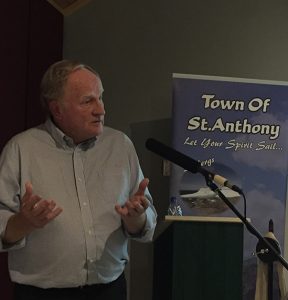 “Why would anyone here want to live anywhere else?”
“Why would anyone here want to live anywhere else?”
Mayor Ern Simms posed this question in his opening remarks at the “Our Way Forward” conference at the Grenfell Interpretation Centre in St. Anthony. His talk was a litany of positivity – of all the advantages of living in the St. Anthony area: transportation, tourism, ecological reserves, new facilities, and…
“…to top this list, we have something no one else has: the greatest people in the world, from all over the world,” he said.
The sense of pride and persistent optimism is palpable at the Wednesday evening session of the conference, fully titled “Our Way Forward: Sharing Knowledge and Building Capacity for Regional Development.” The conference, being held Nov. 15-18, is a collaboration of the Grenfell Campus Office of Engagement and the Town of St. Anthony.
The positivity is not contained within the walls of the conference centre – it permeates the community.
In fact, within 20 minutes of arrival off Route 430, conference participants were met by the cheerful insistence of the front desk clerk at Grenfell Heritage Inn and Suites: “I’m not from here;” she volunteered, “I choose to live here.”
This collective decision of the current population of St. Anthony and the challenges that stem from this decision to stay is at the heart of the conference. Their numbers are dwindling. So how can residents address these changes?
Through adaptation, innovation and policy recommendations, answered Dr. Keith Storey of Memorial University’s Geography Department, who spoke prior to a population panel of local residents (see related story). Dr. Storey was a consultant for the Harris Centre’s Population Project.
Dr. Storey presented to the conference the research he and colleagues are conducting on regional projections for Labrador and the Northern Peninsula 2015-16. The bottom line: the projections aren’t great. In several places in Newfoundland and Labrador – not just St. Anthony – birth rates are declining and outmigration is on the rise. It’s not a new story. But Dr. Storey said we can’t just sit idly and do nothing about it.
“We need to talk about this because this is a problem,” he said of the demographic projections for the area. “We can’t afford to keep doing same things over and over again. We need to act strategically. We’ve got to be realistic and have these kinds of conversations and recognize there will be winners and losers. Not everything can be maintained. Maybe that’s not such a bad thing. Maybe we can do things differently – do almost as much with less and in better ways.”
Most importantly, he said, we can do things together.
“We’ve got to be collaborative,” said Dr. Storey. “It’s not something government can impose – we need to involve the people in the decision-making process. Most of all we’ve got to do something now. It’s going to be painful in some cases, but if we don’t do it, my grandkids, and your grandkids are going to regret it forever.”
This discussion will continue Thursday and Friday with a mayors’ panel, presentations, community radio broadcast, discussions of research findings and economic opportunity panels.
Our Way Forward Part 2: Rural Development through Regionalization
Original story published by Memorial University, Grenfell Campus, which can be accessed here.
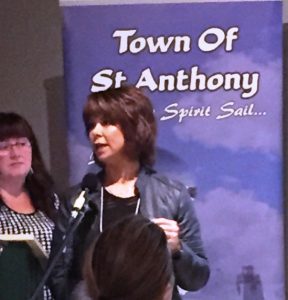 Rural economic erosion. Limited taxation power. Succession planning.
Rural economic erosion. Limited taxation power. Succession planning.
These were the challenges identified by a mayors’ panel at the Thursday morning session of the “Our Way Forward: Sharing Knowledge and Building Capacity for Regional Development” conference. The conference, being held Nov. 15-18, is a collaboration of the Grenfell Campus Office of Engagement and the Town of St. Anthony.
Sheila Fitzgerald, mayor of Roddickton-Bide Arm, and Karen Oldford, mayor of Labrador City, both of whom sit on the board of directors of Municipalities Newfoundland and Labrador (MNL), contributed to the session with an insightful presentation focusing on challenges and possible solutions. Mayor Oldford is president of MNL and Mayor Fitzgerald is the small towns director.
The main issues identified by the mayors included clean and safe drinking water, road and bridge maintenance, wastewater system effluent regulations and regional waste management.
“Seventy-four per cent of 276 ‘small town’ municipalities have one or fewer employees – they have to rely on consultants or volunteers to do the work,” said Mayor Oldford, who is also chair of MNL, referencing positions such as water operators, garbage collectors, municipal planners, snow clearers and deliverers of emergency services.
Add to this equation the fact that federal and provincial legislation requires that municipalities – regardless of their size – adhere to regulations pertaining to waste water treatment and provision of clean drinking water, and the situation becomes even more dire.
“Take wastewater regulations for example,” said Mayor Fitzgerald. “They are a requirement for communities to follow whether you have the money or not. We have a $500 million deficit to meet the needs of wastewater, and an additional $500 million deficit related to drinking water. That’s a $1 billion deficit in total.”
Other participants in the panel discussion following the presentation were St. Anthony Mayor Ern Simms, St. Lunaire-Griquet Mayor Dale Colbourne (MNL northern director), Anchor Point Mayor Gerry Gros, Flowers Cove Mayor Keith Billard and Andy Morgans of the provincial Department of Municipal Affairs (see related story).
Their collective commentary strongly supported the idea that regionalization is the answer. By working together, towns in rural areas can capitalize on shared knowledge and power. The example of the Fogo Island amalgamation was raised, as well as the notion that it would be extremely beneficial to learn from their experiences.
Last year, the MNL Municipal Governance Committee stated in a briefing note that “In that there is little else that can be explored theoretically, at this stage it is recommended that the regional government model…be tested through a series of regional, ‘on-paper’ pilot exercises. This would allow the membership to troubleshoot the model with the assistance of MNL facilitators.”
The outcome of the panel discussion was that most mayors agreed that such a pilot is needed in the region.
“Regionalization is coming,” said Mayor Fitzgerald. “This is our opportunity right now to try it out for size.”
Dr. Kelly Vodden, faculty member with Grenfell Campus’s Environmental Policy Institute, agreed that rural development is indeed possible through regionalization.
Dr. Vodden and her team of co-investigators undertook research in several rural areas in Canada including the Northern Peninsula. Titled “Canadian Regional Development: A Critical Review of Theory, Practice and Potentials,” the research also examined areas in Eastern Ontario, the Kittiwake/Gander-New-Wes-Valley region of Newfoundland and Labrador, the Kootenay area of British Columbia and the Rimouki-Neigette, Québec region.
The research aimed to assess the application and relevance of new regionalism in the Canadian context, to seek Canadian innovations in regional development and to understand how these are evolving and if and how they are shared across space in networks of regional development policy and practice.
More about Vodden’s research can be found at http://cdnregdev.ruralresilience.ca.
This “Our Way Forward discussion will continue Friday with the community radio broadcast, discussions of research findings and economic opportunity panels.
Our Way Forward Part 3: The ways and means to move forward
Original story published by Memorial University, Grenfell Campus, which can be accessed here.
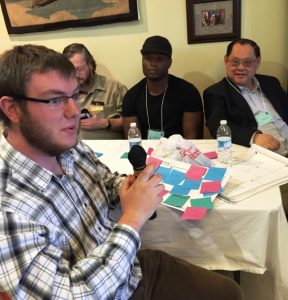 The message coming out of the “Our Way Forward: Sharing Knowledge and Building Capacity for Regional Development” conference is clear: if rural remote areas are to survive, collaboration and regionalization are critical.
The message coming out of the “Our Way Forward: Sharing Knowledge and Building Capacity for Regional Development” conference is clear: if rural remote areas are to survive, collaboration and regionalization are critical.
The conference, held Nov. 15-18, is a collaboration of the Grenfell Campus Office of Engagement and the Town of St. Anthony.
The last few sessions of the conference focused on economic innovation, examples of strategic planning and case studies from around the world. Presentations and panels were delivered by Carey Bonnell of Memorial’s Marine Institute, Sam Elliott of SABRI (St. Anthony Basin Resources Inc.), Caroline Davis, St. Anthony Seafoods, John Hull, Thompson Rivers University, Andre Myers, Viking Trail Association, Mark Lamswood, Western DMO, Terry Hedderson, The Daily Catch, Des McDonald, Grenfell Heritage Inn and Suites, Leanna Butters and Greg Wood of Grenfell Campus, Heather Hall, University of Waterloo and Ryan Gibson, University of Guelph.
Two key international agendas discussed were the fishery/port and tourism, using Iceland as an example of an island region that has refocused the way it does business, in effect saving the country from population decline and economic failure.
Since Iceland began the process of transforming itself through innovation in tourism and new processing techniques in its fishery, its economy has stabilized and tourism numbers have tripled to 1.9 million visitors a year.
The importance of place-based development was discussed by John Hull: “What is it that you can take advantage of that will make people want to visit places like L’Anse aux Meadows?”
Carey Bonnell concluded his presentation with a call to focus on youth in the region: “We need to focus on the needs of the next generation. What will attract or keep them in (the fishing) industry?”
Heather Hall offered some lessons that have emerged from other areas dealing with similar challenges. She said a lack of critical mass can hamper entrepreneurial behaviour. But, she added, building on local and regional assets and collaboration among municipalities creates a region that acts as a surrogate for that critical mass.
Ryan Gibson demonstrated through examples like the WaterWolf District Planning Commission in Saskatchewan that services often challenging to provide by lone municipalities are easier to deliver under a regional model, such as water technician services, regional planning and GIS, land use planning and other service delivery.
The conference concluded with a “Next steps” session focused on regionalization, entrepreneurship/innovation, tourism and the fishery/port. In addition, an entrepreneurial workshop was attended by conference goers and the Grade 12 entrepreneurial class from White Hills Academy. Entrepreneurial ideas generated ranged from food security enterprises and a youth recreation facility to tourism- and entertainment-related operations and affordable housing for seniors.
Photos
Roundtable discussion.
EPI student helping with the community radiothon.
EPI students interviewing Dr. Ivan Emke.
Dr. Jacqui Walsh providing a keynote message on entrepreneurship in rural regions.
Dr. Keith Storey providing a keynote message on demographics and population in NL.
Panelists discussing tourism during the conference.
Mayors that attended the St. Anthony conference.
Dr. Ryan Gibson providing a keynote on governance.
Panelists discussing the fishing industry in NL.
